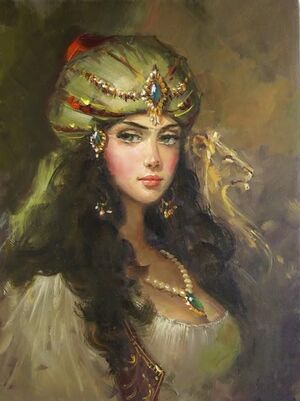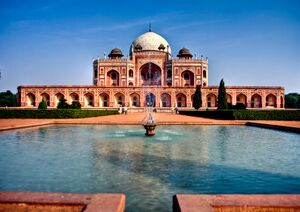Kashmala I Mannadi
| Kashmala I Mannadi | |||||
|---|---|---|---|---|---|
| Maharani of Tennai | |||||
 Portrait of Kashmala I Mannadi by Chandraki Nutan | |||||
| Reign | 23 June 1668– 3 December 1728 | ||||
| Coronation | 23 June 1668 | ||||
| Predecessor | Aiswarya IV | ||||
| Successor | Anushka IV | ||||
| Born | Kashmala Kozai Ganjarejani 4 April 1648 Ganjarejan, Kingdom of Ganjarejan | ||||
| Died | 3 December 1728 (aged 80) Aminjikarai, Tennai | ||||
| Burial | |||||
| Wife | Saaraja Nivane of Koldari | ||||
| Issue |
| ||||
| |||||
| House | Mattasupta | ||||
| Father | Zarhawar Kozai Ganjarejani | ||||
| Mother | Aiswarya IV (Adoptive) | ||||
| Religion | Karami Islam, Buddhism | ||||
Kashmala I Mannadi (23 June 1668 - 3 December 1728), known as Kashmala the Great (Kasmala Periyavar), was maharani of Tennai from 23 June 1668 until her death in 1728. Her reign of 60 years is the longest recorded of Tennaiite history. Kashmala I Mannadi's reign was emblematic of absolutism in Siduri. The maharani surrounded herself with a a variety of significant political, military, and cultural figures, such as (INSERT LIST HERE).
Kashmala began her rule of Tennai in 1668 after the death of Maharani Aishwarya IV. An adherent of the concept of the divine duty of queens, Kashmala continued her predessors' work of creating a centralised state governed from the capital. She sought to eliminate nayak semi-autonomy persisting in parts of Tennai, by compelling many nayaks to inhabit her palace at Aminjikarai. By these means, she became one of the most powerful Tennaiite monarchs and consolidated a system of absolute monarchy that in Tennai until the Chappala Judicial Reforms of 1886. She was dedicated to the idea of religious tolerance and cooperation and issued the Edict of Religion early in her reign. This reaffirmed and made law the long standing and unspoken policy of religous freedom adopted by many previous Tennaiite monarchs.
During Kashmala's reign, Tennai emerged as a leading Siduran power and a center of commerce, culture, and science in Siduri and beyond. The already highly respected Buddhist universities of Tennai, recieved a great deal of support from Kashmala and attracted scholars and students from across Tyran. During her reign, Tennai took part in a number of conflicts of varying scopes. These wars generally concluded in favor of Tennai which also garnered Kashmala the epithet Maharani of Gunpowder and Steel.
